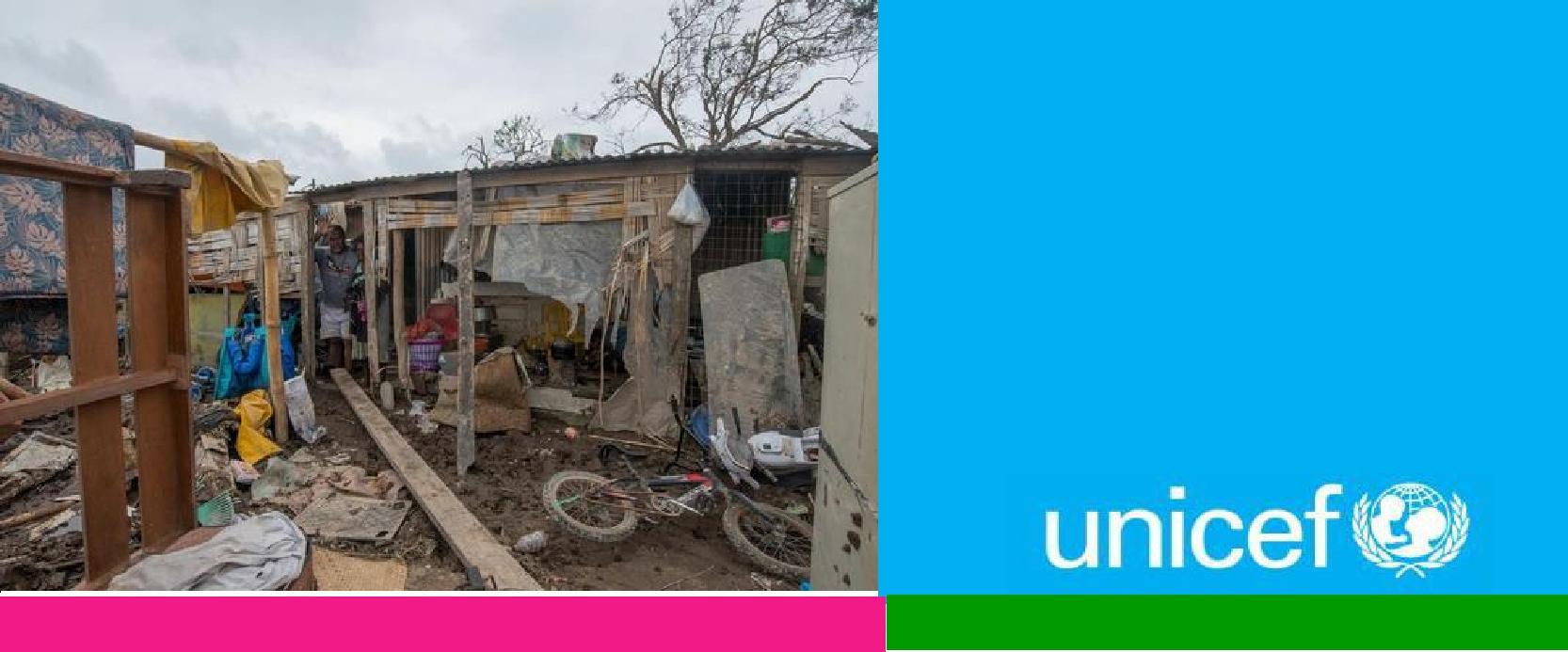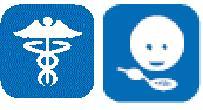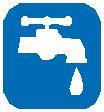
Cialis ist bekannt für seine lange Wirkdauer von bis zu 36 Stunden. Dadurch unterscheidet es sich deutlich von Viagra. Viele Schweizer vergleichen daher Preise und schauen nach Angeboten unter dem Begriff cialis generika schweiz, da Generika erschwinglicher sind.
Unicef.org.hk

PACIFIC SITUATION REPORT
17 MARCH 2015
Cyclone Pam
Situation Report 4
Vanuatu:
Public services being restored in capital city of Port Vila
½ of population in
Vanuatu likely affected
In addition to previously observed damage in Efate
including 60,000
and Tanna, aerial overviews show widespread
damage in Tafea, Malampa (Paama Island, Ambryn
Island) and Penama, Shefa (Erromango Island, Emae
Island, EPI Island)
48 evacuation centres with
At least 34 schools are in use as evacuation centres
2865 people in Efate
3,370 people are in evacuation centres (NDMO) but
216 people in Penama
registration confirmation is still awaited
215 people in Torba
11 confirmed fatalities
(Source: NDMO 16 March)
Hospitals & supplies incurred serious damage; 2 UNICEF tents set up; supplies arrived and more en route
Thousands more with
damaged homes staying with
WASH supplies are due to be airlifted to Tanna on
friends, relatives
March 18. These include 2788 10L containers, 1500
purification tablets and 3784 bars of soap
34 schools in use as
UNICEF-supported
evacuation centres
campaign started in Port Vila and Efate.
5 Provinces assessed &
Supplies committed for nation of Tuvalu, where up to 42%
request assistance in
of families in northern islands were affected
UNICEF has committed WASH & other supplies in
response to Nation of Solomon Islands NDMO call for
UNICEF Needs*
assistance for people in Malaita, Temotu,
USD 3,000,000
Guadalcanal, Isabel and Makira provinces
*subject to revision after Assessments
Kiribati hospital back in operation.

PACIFIC SITUATION REPORT
17 MARCH 2015
Assessment flights are undertaken daily. Those have confirmed extensive damage to southern islands of Tanna, Epi, and others. There are reports of food and water shortages particularly in Tanna. France may support subnational distribution of supplies and assessments. There are no reports of unaccompanied children or separated children in evacuation centers. The measles campaign is on schedule and began yesterday, March 16. A challenge has been to schedule the campaign at night when more people are in the evacuation centers. UNICEF is engaging experienced retired nurses and health workers to help carry out the vaccinations. The power utility, UNELCO, has been securing power lines and repairing the network however generators are hired to pump water into critical areas as well as evacuation centers.
Humanitarian leadership and coordination
The Prime Minister of Vanuatu has declared a state of emergency for Shefa province (where the capital island is located), and is likely to expand this to other affected provinces pending rapid assessment data. The National Disaster Management Office (NDMO) is coordinating the response with support from numerous agencies, including UNICEF, and bilateral arrangements between Governments and major partners. NDMO met partners today to guide all players and present a Government structured system which is now in place. NDMO has established connexion through satel ite phones with chairmen from all provincials' disaster comities and started receiving sit reps. NDMO sent rapid assessment teams (2 in the south, 1 central and 1 to the North).
The National Disaster Management Office (NDMO) is coordinating the response with support from numerous agencies and bilateral arrangements between Governments and major partners. The Emergency Operation Center (EOC) is functional with 24 hour radio broadcasts relayed throughout the country, and monitoring supported by the Vanuatu Humanitarian Team (VHT) members. Two UNICEF staff members have been assigned support roles within the EOC. A United Nations Disaster Assessment and Coordination (UNDAC) team arrived in Port Vila on 16 March as well as staff from the Office for the Coordination of Humanitarian Affairs (OCHA). This additional capacity will be placed at the disposal of NDMO. The UN Emergency Relief Coordinator, Valerie Amos, has designated Osnat Lubrani, the UN Resident Coordinator, as Humanitarian Coordinator for Vanuatu for three months.
UNICEF's response
Education
A total of 34 schools are being used as evacuation centers in Efate, Torba and Penama. UNICEF have
organised two batches of education supplies to be shipped this week. This will include school in a box kits,
recreational kits, early childhood development kits, tents and tarpaulins.
The Education Cluster is targeting about 57,000 affected school aged children from early childhood through to
secondary school. Infrastructure, facilities and resources are damaged in a majority of schools in Efate, Torba
and Penama. The Education Cluster leadership and operation has yet to reach full capacity, however they
have already conducted assessments of schools in Port Vila in particular those used as Evacuation Centers.


PACIFIC SITUATION REPORT
17 MARCH 2015
The UNICEF Pacific Chief of Education has been deployed to Vanuatu to support Save the Children co-lead with Ministry of Education. UNICEF will join the initial assessment team for Tanna Island, now rescheduled for 18 March. The Technical Assessment group is going to carry out a rapid assessment on Malekula, Ambrym and Penama.
Health and nutrition
Six teams comprising nurses from the Ministry of Health were deployed to communities around Port Vila to
provide vaccination against measles, polio and tetanus. These teams also conducted rapid assessments,
distributed bed nets and provided health education to the affected communities.
Japan is deploying 23 health care specialists and Australia 20 health care specialists to assist the Ministry of
Health, especially at hospitals.
A UNICEF Cold Chain Specialist accompanied the above teams to assess the cold chain situation and provide
on-site repairs and training. He also provided on the job training for 6 EPI staff on ice pack conditioning and
proper packing of vaccines in passive containers as well as designed and shared a simple vaccine utilization
forms to summarize vaccine utilization data from the field. The EPI national cold room now has electricity.
UNICEF is part of the 9 member assessment team to be deployed to Tanna tomorrow. Medical and
emergency supplies, comprising of ORS, vitamin A, Albendazole, etc, arrived in Port Vila. UNICEF delivered a
second tent, large size, to the national referral hospital to manage the overflow of patients.
Discussions are underway with the national referral hospital about the establishment of a stabilization center
for malnourished children. Discussions are also underway with World Vision and Save the Children for outer
islands health services.
Water, sanitation and hygiene (WASH)
The UNELCO water system is functioning at 100% in Port Vila. Water quality is safe as extra chlorine has
been added and DGMRW is verifying water quality. UNICEF will support water distribution to Beverly Hills in
Port Vila as their separate piped water supply system is not functional due to on-going power shortage. Water
trucking is ongoing with VMF. A formalised schedule is not yet in place due to lack of access to tanks to
support delivery in strategic locations. UNICEF will install a generator to power the public water supply in
Teoumaville.
WASH supplies (soap, containers, water purification) for 60,000 people will be made available from the
warehouse in Port Vila, and additional supplies (WASH & dignity kits) are being transported from prepositioned
stocks in Fiji. WASH supplies have been delivered to the Bauerfield airport and are due for Tanna on March
18. These include 2788 10L containers, 1500 purification tablets and 3784 soaps.
UNICEF is establishing partnerships with agencies (OXFAM, Save the Children and Live and Learn) to
distribute these supplies. Current situation in evacuation centers is sanitation varies from 8 to 107 persons per
toilet, with 95% having access to running water and 20% practicing hand washing.
The procurement of de-sludge pumps is in process and UNICEF is identifying partners to undertake the
cleaning of ground water sources affected with sea/ surface water intrusion.
We are considering the deployment of a WASH coordinator at provincial level- specifically for Tanna & Shefa
to facilitate the provincial government in the planning and provide technical advice. UNICEF staff is part of the

PACIFIC SITUATION REPORT
17 MARCH 2015
assessment team deployed under guidance of the NDMO. More support can be expected once we have a better understanding of the situation on the ground.
Child protection Known needs specifically in relation to gender and protection are limited to evacuation centres in and around Port Vila. UNICEF supported NDMO to conduct an Evacuation Centre Surveys in 16 of the Evacuation Centers in Port Vila. Standards vary greatly between centres, but common themes are over-crowding, lack of privacy, lack of lighting or any kind of emergency power supply, structures that couldn't be secured. Bathing facilities were often lacking. Tensions within centres not reported for the most part, nor were tensions between evacuation center residents and host communities. No reports of unaccompanied children or others with high-level care needs being separated from primary carers. A small number of pregnant women were identified as being in the centres, and a small number of very young (days old) babies. This information is very partial as data was returned for less than half of the identified evacuation centres. Further information is expected as service provision expands. In addition to the national Child Protection officer, and a Child Protection specialist from Fiji, UNICEF Pacific is deploying a Child Protection in emergencies from Indonesia. There is a gap in information on the full extent of displacement and conditions in evacuation centres but this should improve within the next day or two as assessments are taking place, which will allow for a more refined planning of support. With the Ministry of Justice & Community Services and the Ministry of Education, UNICEF is planning a Training of Trainers to address the psychosocial needs of children along with the development of materials for young children and caregivers who have been traumatized and experiencing post-traumatic stress.
The Gender & Protection cluster will now convene daily meetings at NDMO; UNICEF facilitated the inclusion of the Vanuatu Society for Disable People (VSDP) to be an active member of Gender & Protection and Education cluster groups.
Communications for communities
There is still no radio or telephone communication with the outer islands. Digicel communications are active in central Port Vila only. Digicel and TVL are working together to get communications back up. Australian Broadcasting Corporation is doing an assessment of radio transmitters and reports that there is a need to send temporary mobile medium wave transmitters pending longer term repairs. The NDMO has a communication plan in place which includes:
Radio: pre-recorded messages with VBTC national radio
TV: advert prepared for airing on national TV when this is functional
Mobile phones: emergency text messages with updated information will be sent to all TVL and Digicel
Australian Broadcasting Corporation staff are working with Vanuatu BTC to operationalize this plan once radio broadcasts are working again. Supply and logistics
A number of supplies have been airlifted including five basic health kits with each kit covering 10,000 patients; 1,508 school backpacks with stationery supplies; 31,300 ORS sachets; 330 zinc tablets; 32 de-worming tablets; 69 recreation kits to reach a total of 6,210 children (90 children per kit); 3,000 WASH kits; 200 hygiene kits; 3,000 soaps for hand washing; 5 x 5,000 litre collapsible water tanks and 5 x 1,500 litre collapsible water tanks.
PACIFIC SITUATION REPORT
16 MARCH 2015
Digicel Pacific provided free carriage to some of our supplies airlifted last night. More supplies are scheduled to leave on upcoming commercial flights, which will include 91 school in a box kits, 11 recreational kits, 22 early childhood development kids, tents and tarpaulins. A RNZ Air force flight was dispatched to Tanna this afternoon with an assessment team as well as an initial consignment of supplies as well. UNICEF has been working with NDMO, WFP and other partners on a logistics plan for the smooth distribution of humanitarian supplies from designated hubs and the airport.
Tuvalu, Solomon Islands, and Kiribati
TUVALU
A state of emergency has been declared in Tuvalu, following tidal surges caused by Cyclone Pam. UNICEF has one staff in Tuvalu who is participating in all coordination meetings. Photos from aerial surveillance conducted by the New Zealand air force reveal limited damage to houses and other infrastructure, although the situation may be extremely different on the ground. Assessments provided suggest that 1,500 people are directly affected, representing 42% of households on the worst hit islands in the north of the archipelago. Detailed information on the extent of damage will be provided by the assessment team as soon as electricity and internet is restored in Nui (the first island visited). The New Zealand and the Australia governments are committing 50,000 AUD each. IFRC have committed 60,000 AUD. Funds might be used for mid-longer term recovery. A logistics/aid coordination expert a WASH emergencies specialist will shortly be deployed from Australia. UNDP and UNOCHA have deployed two people and are due to arrive on Thursday 19 March, to support the government of Tuvalu in assessing early recovery needs; Facilitate the integration of early recovery into the Tuvalu humanitarian action plan; UNICEF Health and WASH supplies, which include 1,000 packs of water purification tablets and vitamin A capsules were meant to be air lifted today but were offloaded by the commercial airline and will be taken on the next available flight - Thursday March 19. Australia suggested that UNICEF/SPC WASH cluster could support the Specialist in the recovery phase.
SOLOMON ISLANDS
The alert for Cyclone Nathan is now cancelled. A number of provinces and islands were affected by Cyclone
Pam, mainly Malaita, Temotu, Guadalacanal, Isabelle. An aerial assessment on Temotu last Saturday shows
Anuta outer island was severely hit. However, due to total absence of communications, damage and affected
population are yet to be confirmed.
An initial assessment and response (IAR) team from Honiara and Temotu is heading to Anuta and will also
deliver disaster relief items. It takes 16 hours to reach the island by boat. National Disaster Council is
considering a state of natural disaster for Anuta but this is not confirmed yet.
NDMO has activated all clusters. So far only IAR and Logistics cluster have held meetings. The Education
cluster will send an emergency focal point to Temotu to assess the situation. NDMO has called for indicative
commitments from partners, and UNICEF is ready to provide 200 water containers, 400 soaps, acquatabs, and
some IEC materials for Anuta island; 200-300 water containers to World Vision for further distribution to other
outer islands in Temotu province. A UNICEF staff member will be deployed to Temotu on 21 March to monitor
distribution of WASH items, community awareness, assessment on child protection issues. Travel by boat to
Temotu takes 2-3 days.
KIRIBATI
PACIFIC SITUATION REPORT
16 MARCH 2015
Four metre high waves were experienced in Kiribati on 13 March, causing extensive damage to the Dai Nippon Causeway. On the southern islands Tamana and Arorae 20 houses along the shore on Arorae were destroyed, and families are now housed in schools. Some have started rebuilding their houses further inland. No figures yet from Tamana on how many houses affected. Onotoa island reported that the causeway was damaged preventing vehicles from crossing to the islet.but no information on what extent of the damage, and how many people affected. In Tarawa, the causeway connecting Betio and Bairiki, reopened, but with limited load of not more than 2tons. Road condition is very bad throughout the atoll. Tabonkabwauea Bairiki seawall on the Oceanside is badly damaged causing power off in the area. Tebikenkora Eita village seawalls badly damaged and seawater running into all (10) houses of this community. The Betio national hospital and maternity ward was damaged and patients had to be temporarily relocated.
Repairs have been undertaken and patients were moved back to wards on Monday 16 March. No disease outbreaks reported so far. Schools are opened but a lot of children especially senior secondary schools cannot reach school on time due to lack of transport as hardly any buses now operate. Town councils now provide trucks to transport school kids. Government provides transport for government workers. The disaster management Committee is monitoring progress and assisting communities to build or strengthen sea walls with local contractors. A small contingent of UNICEF emergency supplies is available from prepositioned stocks in Tarrawa, and an
additional consignment is expected to arrive on 24 March.
Source: http://www.unicef.org.hk/upload/emergencies/Cyclone_Pam_Situation_Report_4.pdf
J. AMER. Soc. HORT. SCI. 118(2):298-303. Genetic Similarity Among Brassica oleracea L. Genotypes as Measured by Restriction Fragment Department of Horticulture, University of Wisconsin, Madison, WI 53706 Mary K. Slocum2Department of Biology, University of Utah, Salt Lake City, UT 84112 Dawn A. DeVos3
The influence of surface treatments on the service lives of concrete bridges SA Freitag SM Bruce Opus International Consultants Ltd, Lower Hutt NZ Transport Agency research report 403 ISBN 978-0-478-36421-7 (print) ISBN 978-0-478-36420-0 (electronic) ISSN 1173-3756 (print) ISSN 1173-3764 (electronic) NZ Transport Agency Private Bag 6995, Wellington 6141, New Zealand Telephone 64 4 894 5400; facsimile 64 4 894 6100 [email protected] www.nzta.govt.nz









